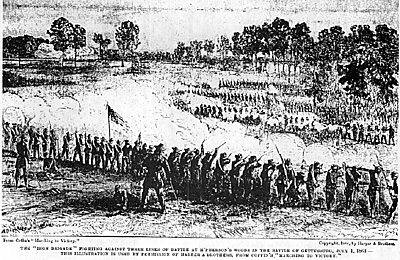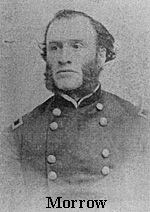 The 24th Michigan Volunteer Infantry had the distinction of having the largest number of casualties in any regiment at Gettysburg.
The 24th Michigan Volunteer Infantry had the distinction of having the largest number of casualties in any regiment at Gettysburg.
At right: The Iron Brigade fighting in McPherson's Woods at Gettysburg.
A comparitive latecomer to the war, this regiment was selected to join the Iron Brigade to keep the all western troop nature of that brigade. When the unit marched into the camp of the already famous brigade, they were met by silence and an air of contempt. However, acceptance by the veteran soldiers from Wisconsin and Indiana was not far from coming, such being given after the unit performed the manual of arms while under a hot fire at Fredericksburg. The information contained in this capsule history comes in excerpts from their regimental history entitled, History of the 24th Michigan of the Iron Brigade, written by O.B. Curtis, a veteran of the regiment. As in past articles, I believe that the flavor of battle is best stated by those who actually smelled the smoke! The parts reprinted here from the regimental history give the reader an idea of the unit's fighting history during their enlistment.
Corporal Orson B. Curtis was discharged for wounds received at Fredericksburg. He had been left behind at a hospital at Brook's Station, VA., when the army moved to Fredericksburg. He heard the firing on the Rappahannock and, with permission from a doctor, started for his regiment. Marching 14 miles, he fell in with the 7th Michigan Infantry, crossed the Rappahannock with them in boats, and helped clear the enemy from their rifle pits. He was wounded in the subsequent engagement, having his left arm amputated on the field.]
THE IRON BRIGADE
Thursday, October 9, 1862, was the formal date of our admission to the Army of the Potomac. This day the regiment was inspected by General Gibbon of the "Iron Brigade", to which we had been assigned by General McClellan. The latter had applied to the War Office for some western troops, saying that he wished some Wisconsin or Indiana men for a western brigade. If he could not have any from these states, he would take one from Michigan. The 24th Michigan was sent up, and assigned to General Gibbon's command. It was not at his request, and he received us with considerable reluctance. Our regimental inspection over, we
were drawn up in front of the rest of the brigade, whom we almost outnumbered. Our suits were new; theirs were anny-worn. Our Colonel extolled our qualities, but the brigade was silent. Not a cheer. A pretty cool reception, we thought. We had come out to reinforce them, and supposed they would be glad to see us. Neither was satisfied with the other.
GETTYSBURG
At an early hour on Wednesday morning, July 1, the men partook of their frugal meal of hardtack, pork and coffee, as usual. The Pennsylvania line had been reached and the forces of the enemy must be met very soon, though none suspected that the foe was within a few hours' march. Before resuming the daily journey it was deemed proper to assemble the regiment for prayer. During Chaplain Way's invocation, cartridges and hardtack were distributed among the men. Time was precious and not to be lost.
The line of advance was resumed up the Emmitsburg road. All seemed merry until yonder booms and puffs of cannon smoke told plainly that the opposing pickets had met. Our Union cavalry had halted the enemy, dismounted, and were having a hot time to keep the foe in check until the approaching I Corps could arrive. Suddenly a fleet horseman from the front dashed up with a hasty message for General Merideth of the "Iron Brigade". Route step and merriment now gave way to a quick pace, while all non-combatants and pack mules were ordered to fall to the rear, as the regiment with its brigade filed off the road to the left about a mile from the town, near Cordon's House.
Capture of Archer's Brigade
The Iron Brigade advancing in order - Second and Seventh Wisconsin, Nineteenth Indiana and Twenty-fourth Michigan - was double-quicked into line, without guns being loaded or bayonets fixed, which was done on the run. (The Sixth Wisconsin of this brigade had been detached for service elsewhere in this corps during the morning). Hastening across the fields the Iron Brigade's right wing halted on the crest of a ridge looking down into a wooded ravine, from which blazed a shower of bullets from Archer's Tennessee Brigade. Its left wing, consisting of the 24th Michigan, swung clear around the forest in the rear of this Tennessee Brigade. A special in the New York Tribune thus described the event:
In this maneuver, while the greater part of Archer's Brigade was thus captured, a large number of them ran for the railroad cut a little to the north and concealed themselves therein. But soon after, the 6th Wisconsin of the Iron Brigade (this day on detached duty), succeeded in capturing this remnant of Archer's Brigade. Thus the Iron Brigade had the honor of capturing this whole Tennessee Brigade. The 24th Michigan was on the extreme left of the Iron Brigade during the charge, and swept over the hill, down across Willoughby run, swinging clear around the ravine in which was Archer's forces, most of whom were thus captured with General Archer himself. It was a victory indeed, but at the cost of precious lives, including its valiant color-bearer, Sergeant Abel 0. Peck. The regiment then about-faced and drove the uncaptured foe over the crest and a hundred yards beyond, but soon after withdrew to the eastern side of the stream and hastily formed, during which Lt. Colonel Mark Flanigan lost a leg, and Adjutant Rexford was severely wounded.
Battle Line In McPherson's Woods
The Iron Brigade was now on the extreme left of the Federal position, with the Twenty-fourth in the center, the Nineteenth Indiana on its left, and the Seventh and Second Wisconsin on its right, in McPherson's Woods, something over a mile west of the town. The right of the Twenty-fourth was curved back to unite with the Seventh Wisconsin, its two wings forming the sides of an obtuse angle. The left of the Twenty-fourth extending down a hillside to a deep hollow was scarcely visible to the right wing, and was completely commanded (as was the 19th Indiana) by the enemy on the hill opposite, a position that plainly could not be maintained.
It was now eleven o'clock, and a brief lull ensued in the enemy's firing, evidently to allow his tardy forces to take position. But he shelled the woods meanwhile, and Company B, under Lieutenant Fred A. Buhl, were deployed as skirmishers. The enemy's strong divisions of Heth and Pender, supported by 80 pieces of artillery, vehemently attacked the little First Corps of 9000 men as if to annihilate it ere aid could come to it.
Says the historian Abbott:
It was well after one o'clock when two divisions of the Eleventh Corps arrived, forming a broken are of baffle-line around to the north of the town. But they were soon outnumbered by the arrival from the opposite direction of Ewell's Confederate Corps, which united with Hill's Corps, already confronting the First Corps, exceeded the Union forces nearly two to one. Two-thirds of Lee's army thus confronted the smallest Union corps and part of another.
EXCERPTS FROM THE REGIMENTAL HISTORY BY O.B. CURTIS
Reynolds has ridden into the angle of wood, a bow-shot from the Seminary, and cheers the Iron Brigade as they wheel on the flank of the oak trees for a charge. Like a great flail of steel they swing into the shadows with a huzza that is terrible; low, crouching by his horses head, the general peeps into the depths of the grove. "Boom" from the oaken recesses breaks a hailstorm of lead, and Reynolds, with the word of command upon his tongue, falls forward. The architect of the battle has fallen dead across its portal! Across the brook and up the hill, out from the wooded ravine, two jagged arcs leap into sight Huzza! From the skirts of the oak the great double doors of the Iron Brigade shut together, with a slam as if colliding mountains, folding between them 1500 rebel prisoners of war.
 Colonel Morrow (at righht) thought this part of the line should have been formed on the elevated ground behind and represented three times to headquarters that the position was untenable. But the invariable reply was that "the position must be held".
Colonel Morrow (at righht) thought this part of the line should have been formed on the elevated ground behind and represented three times to headquarters that the position was untenable. But the invariable reply was that "the position must be held".Noon came and passed and no help for the dwindling band who stood among their dead, immovable. Glorious among this Spartan Corps flashed the Iron Brigade. resistless as Western nerve and pluck can be.
Back to The Zouave Vol IV No. 1 Table of Contents
Back to The Zouave List of Issues
Back to Master Magazine List
© Copyright 1990 The American Civil War Society
This article appears in MagWeb (Magazine Web) on the Internet World Wide Web.
Other military history articles and gaming articles are available at http://www.magweb.com